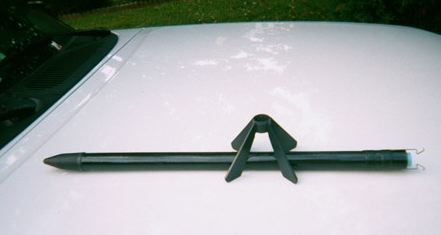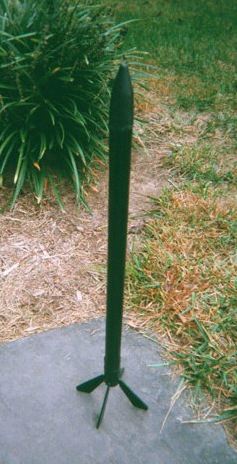| Manufacturer: | Scratch |
 Skyrocket Skyrocket by Richard Stafford |
| Motivation Several summers ago, I became reacquainted with the hobby for the third time, having just picked up a copy of High Power Rocketry. While vacationing at Myrtle Beach, I spent many hours reading the magazine, contemplating my first high power project, and generally thinking rockets. Since it was near the 4th of July and there is no shortage of fireworks stands in South Carolina, there was also no shortage of fireworks 'leftovers' on the beach. I couldn't resist grabbing nose cones and plastic fin units, which were stashed safely with the shells the kids found (not high power stuff, but what the heck?). When I got home, it wasn't long before I wanted to put some to use.
Construction 1. 18" section of B-50 I first built the motor adapter, which included a thrust ring. This unit was glued into the BT-50 by inserting a spent casing, placing the plastic fin can over the end of the casing, and pushing in the adapter until the fin can was seated in the body tube. I then took the engine retainer clips, placed the ends over the fin can, and marked where the forward tabs would go. Slits were cut to accommodate the tabs on the retainer clips. To hold the clips, I cut 1/2" strips from some reinforced packing tape, placing one near the forward tabs and one about 1/4" behind that. I put a thin layer of epoxy on the tube before the tape and used 2 wraps of tape. I wasn't sure of the stability of the rocket so I added some of clay inside the nose cone and glued the cone onto the nose cone shoulder using plastic glue. This was later proven to be a mistake. |
| Flight Report Flight #1 The flight was high and straight. The body was recovered undamaged but the nosecone separated and was lost. Too much weight and the wrong glue.
Post Mortem Flight #2 |
 |
 |

